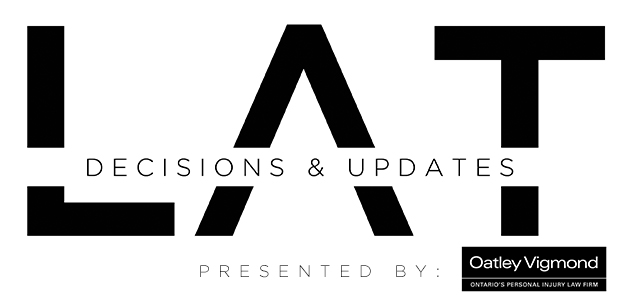V202 – Caution: Always Be Aware of the Two-Year Limitation Period

When an insurer denies a benefit, the injured person has two years from the date of denial to initiate a dispute. In past, disputes were initiated by way of submitting mediation applications to FSCO. Since April 2016, we now initiate disputes by submitting applications to the Licence Appeal Tribunal.
On November 18, 2016, Arbitrator Schnapp of FSCO decided the case of Mayo and Economical Mutual Insurance Company (FSCO A14-008047). Mr. Mayo had been involved in an accident in 2005 and suffered severe injuries including a below-knee amputation. Mr. Mayo received both attendant care and housekeeping benefits up until the 104-week anniversary of the accident. The benefits were then terminated by Economical given that there was no coverage beyond the anniversary unless there was a confirmed catastrophic impairment. In the termination letter, Economical included wording regarding Mr. Mayo’s rights to dispute the termination and gave warning of the two-year limitation for pursuing a dispute.
In 2014, Mr. Mayo submitted an application for determination of catastrophic impairment which was eventually accepted. With the catastrophic acceptance, Mr. Mayo anticipated renewed coverage for housekeeping and attendant care benefits. He made effort to claim the benefits but found his claims rejected by his insurer. Economical responded by maintaining the denial of the benefits as had originally been imposed in 2007; the two-year limitation for disputing the termination had expired in 2009.
In his decision, Arbitrator Schnapp found that Economical’s original denial of benefits was clear and unequivocal. He concluded that the denial was a valid denial and the two-year limitation for initiating a dispute had been missed. The decision confirmed that Mr. Mayo was precluded from proceeding to arbitration in dispute of the attendant care and housekeeping benefit denials. Economical was thus able to maintain its denials of the benefits regardless of the confirmed catastrophic impairment and without consideration of what could certainly be a significant need for service.
While we recognize that the Licence Appeal Tribunal is not bound by past FSCO decisions, it is important to note that the Tribunal has already considered a highly comparable case as addressed in 16-003034, S.T. and Economical Mutual Insurance Company. In this case, the accident occurred in 2008 and the insurer denied ongoing housekeeping and attendant care benefits at the 104-week anniversary. In 2015, S.T. was declared as catastrophically impaired and made effort to renew her claims for housekeeping and attendant care benefits. The insurer responded with a maintained denial of the benefits given the expired limitation period.
In her decision, Vice Chair Heather Trojek rejected the applicant’s position that the limitation period should not begin to run until the catastrophic impairment is first discovered. She confirmed that Economical’s 2010 denial of the benefits was clear and unequivocal. She agreed that the limitation period for disputing the termination had expired and dismissed the application accordingly. Once again, Economical was in a position to maintain its denial of benefits in despite of a confirmed catastrophic impairment.
We presume that neither Mr. Mayo nor S.T. had foresight of the need to dispute the denials of housekeeping and attendant care in the absence of first achieving catastrophic impairment designations. After all, without the catastrophic impairment there can be no payment of ongoing attendant care and housekeeping benefits so why would one dispute the non-catastrophically based termination? We can only imagine their surprise to see the claims rejected upon achieving catastrophic status.
These two decisions highlight the importance of limitation periods and the need to be cautious and pro-active in protecting one’s rights to future benefit claims. Regardless of confirmed impairment, and need for service, the insurer will not be obligated to extend benefits if the benefits are claimed after the expiry of a two-year limitation period.
Injured parties may find themselves in the position of having to make application to the Licence Appeal Tribunal in advance of catastrophic impairment applications being considered, submitted, or accepted. Failing the insurer confirming agreement to suspend an approaching limitation period, we must bring forward such applications in advance of limitation periods if we are to protect our clients’ rights to claim future benefits. It will be interesting to see how the LAT will decide such cases in the absence of an already confirmed catastrophic impairment.
Official Decisions:
16-003034, S.T. and Economical Mutual Insurance Company
FSCO A14-008047, Mayo and Economical
Questions and/or comments? We’d love to hear from you. Click here to send us an e-mail.
